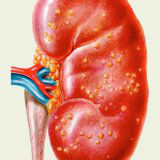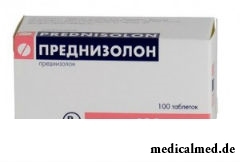





Intersticial nephrite
 Intersticial nephrite (tubulointerstitsialny nephrite or tubulointerstitsialny nephropathy) – the pathological process characterized by chronic or acute inflammatory defeats of tubules of kidneys and intersticial fabric. Use of drugs for infections, obstruction of urinary tract, metabolism disturbances, toxic influences and malignant new growths can be origins of intersticial nephrite.
Intersticial nephrite (tubulointerstitsialny nephrite or tubulointerstitsialny nephropathy) – the pathological process characterized by chronic or acute inflammatory defeats of tubules of kidneys and intersticial fabric. Use of drugs for infections, obstruction of urinary tract, metabolism disturbances, toxic influences and malignant new growths can be origins of intersticial nephrite.
At acute intersticial nephrite there are inflammatory changes of tissues of kidneys that as a result can lead to development of a renal failure.
At chronic intersticial nephrite there is a development of fibrosis of intersticial fabric, defeat of balls (at a late stage of a disease) and an atrophy of tubules. In the started state chronic intersticial nephrite leads to a nephrosclerosis (wrinkling of kidneys).
Reasons of intersticial nephrite
Intersticial nephrite can arise because of reception of the following medicines:
- Beta лактамных antibiotics;
- Ftorkhinolonov;
- Sulfanilamidov;
- Non-steroidal anti-inflammatory drugs;
- Diuretikov.
Can lead reception of such drugs to development of acute intersticial nephrite as:
- Allopyrinolum;
- Ampicillin;
- Gentamycin;
- Ibuprofen;
- Immunodepressants;
- Captopril;
- Kloksatsillin;
- Naproxenum;
- Penicillin;
- Rifampicin;
- Thiazide diuretics;
- Phenytoinum;
- Fenapdion;
- Cefalotin.
Also bacterial (diphtheria, streptococcal infections, legionellosis and leptospirosis) and virus (Epstein-Burra's virus, a cytomegalovirus and an arbovirus) infections, immune diseases (Shegren's syndrome, a system lupus erythematosus, a syndrome of rejection of a transplantirovanny kidney and a cryoglobulinemia), limfoproliferativny diseases and a multiple myeloma are the reasons of intersticial nephrite.
Obstruction of urinary tract, granulematozny diseases, disturbance of metabolism of cystine, urates, calcium and oxalates, vesicoureteral reflux and long influence of heavy metals lead to chronic intersticial nephrite.
Sometimes there is impossible an establishment of the reason of intersticial nephrite - in such cases the use of the term "idiopathic intersticial nephrite" takes place.
Symptoms of intersticial nephrite
Clinical displays of intersticial nephrite are the eosinophilia, fever and skin rash. Fever is a symptom of the intersticial nephrite observed practically at all patients. Skin rash is a symptom of the intersticial nephrite which is found approximately at a half of patients. Places of its emergence are the trunk and proximal departments of extremities, often skin rash is followed by an itch.
Also symptoms of intersticial nephrite are:
- Arthralgia;
- Back pain;
- Gross hematuria;
- Moderate proteinuria;
- Leukocyturia;
- Microhematuria;
- Proteinuria;
- Increase in kidneys;
- The increased maintenance of IgE in blood;
- Polyuria;
- Oliguria.
Treatment of intersticial nephrite
Treatment of intersticial nephrite (acute) consists in cancellation of drugs which can be the reasons of its emergence. At reception of a course of antibiotics, non-steroidal anti-inflammatory drugs and other medicines the repeated research of content of urea and creatinine in blood serum, definition of a daily urine, frequent checks and analyses of urine is necessary, and also at an opportunity it is necessary to replace nefrotoksichny agents with non-toxic.
 Important elements of treatment of intersticial nephrite are: ensuring adequate hydration of the patient, reduction of doses and frequency rates of administration of other drugs, cancellation of the kidneys of medicines and inhibitors of an angiotensin-converting enzyme breaking functions. If intersticial nephrite leads to increase of a renal failure, then Prednisolonum reception is necessary (60 mg a day for 10-14 days).
Important elements of treatment of intersticial nephrite are: ensuring adequate hydration of the patient, reduction of doses and frequency rates of administration of other drugs, cancellation of the kidneys of medicines and inhibitors of an angiotensin-converting enzyme breaking functions. If intersticial nephrite leads to increase of a renal failure, then Prednisolonum reception is necessary (60 mg a day for 10-14 days).
At heavy renal failures use pulse therapy Methylprednisolonum is possible (1 g intravenously daily for three days).
At treatment of the intersticial nephrite accompanied with an oligoanuriya and bystry increase of level of creatinine purpose of a hemodialysis is necessary.
The patient with intersticial nephrite has to be informed that use of medicine which caused development of a disease, unacceptably in the future as repeated introduction of this medicine can lead to development of a catastrophic renal failure.
If your liver ceased to work, death would come within a day.

We present to yours the TOP of the medicamentous means exerting the stimulating impact on a potentiality, i.e. on ability of a muzhcha...
Section: Articles about health
Musicotherapy – a treatment method which caused and causes a set of a controversy concerning its efficiency. However the facts are relentless: during the numerous researches curative impact of music on an organism was scientifically confirmed. Since then in a number of the countries a method...
Section: Articles about health
EKO, or extracorporal fertilization - a method of treatment of infertility which became the reason of a set of broken-down copies in due time accused the people working on its creation neither more nor less of rivalry good luck. Already very few people deny the right of a method for existence, and to surprise nobody with "children from a test tube". And nevertheless, a certain magic in the procedure of artificial fertilization is, process of origin of new life is always a secret, and even it р now...
Section: Articles about health
The winter swimming in open reservoirs called in our country by "winter swimming" – officially recognized sport and one of the ek...
Section: Articles about health
The majority of gynecologic diseases prove three main signs, each of which speaks about need of a visit to the gynecologist. Certainly, it is possible to establish the exact diagnosis only after inspection, but on the basis of some signs it is possible пр...
Section: Articles about health
Ayurveda - the most ancient tselitelsky practice which came to us from India. It represents the doctrine about maintenance of physical, psychological and moral health of the person by means of the complex of procedures including a diet, cleaning of an organism, breathing exercises, massage, and in case of a disease - and medicinal therapy. The healers practicing Ayurveda assign very important part to spices, and at the heart of Ayurvedic drugs, as a rule, there are they. It is considered that spices not of t...
Section: Articles about health
For the time being the perspective of heart diseases seems to most of people remote and foggy. But sooner or later практичес...
Section: Articles about health
Food with the increased content of sugar is attractive to most of people - it is scientifically confirmed fact. Business here not in intemperance or dissoluteness: the sweet food is associated since childhood with feeling of rest and safety which is felt by the kid, to...
Section: Articles about health
For the help to doctors in the choice of optimal solutions for treatment of various diseases the Cochrane scientific organization (Cochrane) conducts joint researches with representatives of scientific community around the world. The analysis of a series of the conducted researches of the drug Oscillococcinum® relating to group of cold remedies became one of the last methanolyses....
Section: Articles about health
The varicosity has familiarly many, statistically, this disease more than a half of all adult population. As...
Section: Articles about health
Any of us is not insured from a heavy illness of the loved one. Happens and so that someone from family members becomes the bed patient, and remains in such state for a long time. It extremely suppresses both the most injured, and all it to...
Section: Articles about health
The body of the person almost for 60% consists of water. It is so important for normal functioning of an organism that loss of only one and a half percent of liquid already leads to the most unpleasant effects. The problems connected with deficit of water can overtake also the healthiest person if he, for example, spends several hours under the scorching sun, without having taken with themselves drink, but is very simple to correct health in this case. It is much more difficult to minimize effects of other reasons about...
Section: Articles about health
Traveling all over the world, many try to try the most exotic dishes of national cuisines. Exists even so-called died away...
Section: Articles about health
Bulimia and anorexia, are heavy deviations of a feeding behavior, become a cause of death of patients much more often than all other nervous breakdowns combined. In 60% of cases two illnesses accompany each other: patients feel horror before danger on...
Section: Articles about health
Long time antibiotics were considered as a panacea from all diseases and were appointed even at insignificant symptoms of an infection. Even now not everyone knows in what force of antibiotics how and when they should be accepted. Let's discredit 7 popular myths about such drugs....
Section: Articles about health
Scientists have no unambiguous opinion on a proximate cause of emergence of a carcinoma cutaneum today. Are precisely established only фа...
Section: Articles about health
Proofs of efficiency of Mildronate at treatment of coronary heart disease with stenocardia can be found in many publications of the end of the twentieth century. Researches were conducted since 1984, including placebo - controlled effects. In total клиничес...
Section: Articles about health
All parents are ready to what the baby often and pisat much. Since then, as the absorbing diapers strongly became current, keeping of the kid in dryness does not represent any problems. But if the grown-up kid continues to urinate in panties, parents begin to feel concern – whether it is normal, or the kid has an urine incontience? Let's try to understand what is enuresis why it arises at children and at what age it is necessary to begin it to treat....
Section: Articles about health
Milk and products of its processing by right occupy one of the main places in a diet of the modern person. They contain necessary...
Section: Articles about health
Eyes – one of the most vulnerable areas on a face therefore age changes concern them first of all. Whether it is possible to keep look youth for many years and what procedures are offered for achievement of this purpose by cosmetologists? And maybe, only thing of a vari...
Section: Articles about health
The number of long-livers is very small. One person from 5 thousand lives up to age of 90 years, and the centenary boundary steps over only one of 20 thousand. However, doctors claim that each of us is quite able to affect own destiny. At the same time it is not so much about living as long as possible, how many about an opportunity to keep physical and intellectual activity and to avoid decrepitude. We will also talk about the ways helping to achieve this result today....
Section: Articles about health
People know that thermal sources have salutary force long ago. Treatment by natural waters is one and...
Section: Articles about health
The main role in development of a peptic ulcer of a stomach and duodenum the bacterium Helikobakter plays pilor. Activity and the strengthened reproduction of this microorganism lead to weakening of protection of mucous membranes and their erosive damage. Manifestations not...
Section: Articles about health
The phenomenon of improvement of a condition of the patients at administration of drugs who are not containing active agents, so-called effect of placebo is known long ago. At the end of the 18th century the American doctor Perkins began to treat people the "miracle" sticks made of alloy of steel and brass. Was for several minutes to press such subject enough to a sore point that it became much easier for the patient. Having suspected Perkins of charlatanism, his colleagues tried to repeat "miracle" by means of sticks, steles...
Section: Articles about health
The climax, or menopause is the normal process of the termination of genital function of the woman which is followed serious hormonal...
Section: Articles about health
From the failure of work of immune system which is shown in the form of an allergy, statistically, more than 40% of the population of the globe suffer. In most cases pathological reactions cause the substances which are contained in food stuffs, hair of animals, medicines...
Section: Articles about health
Life of the modern child is extremely active and difficult. Information strain which is experienced by the school student and did not dream pupils of last times. Careful parents, wishing well to the children, will organize a set of additional classes in circles, sports sections and music schools. In such situation the child needs continuous care and good nutrition to keep health and high performance....
Section: Articles about health
